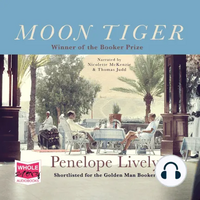Take a photo of a barcode or cover
I thought it a bit of a poor man's Waterland / English Patient. The thoughts are there, the musings about history and personal story and all of that, and I felt that the bits set during the war you could really feel for Claudia, but the rest of it got a bit confusing and rambly. I'm not sure if it's because I read it as an ebook - perhaps the print version has clearer demarcations? - but the book tends to flip from first to second to third person, from past to present, from linear to repeating the exact same scene, and there's no sense of break before the switch happens. This makes it very difficult to follow.
Would definitely recommend Waterland instead if the themes of history and story interest the reader.
Spoiler
The whole diary entry bit at the end was also a bit cliched. I thought that the bits with Tom in already spelt out this feeling, and it wasn't necessary to beef it up with having a mysterious diary suddenly pop up - it added nothing but cliche.Would definitely recommend Waterland instead if the themes of history and story interest the reader.
A meditation on history - collective memory - and an individual's real or imagined memories of their own life. Memory is not linear, and history is public property. When you look back on your life, in your memory, it all happens at once, instantaneously. Fictional stories are forever encapsuled on the page, but much of our own lives are undocumented and therefore in some sense themselves fictional. Memory is imagined rather than remembered. After you die, you are preserved in the memory of others. They are your afterlife, just as the next generation preserves events in history. Everyone and everything lives on in those that come after, and time marches on.
A classic!
During the first few chapters I was on a 3-star rating but it did not take me long to become totally absorbed and loving every line .....
I read the book after a recommendation on a tv book club program and just on a hunch that I might enjoy it. I was not aware of Penelope Lively and I am not sure I would have understood or liked the book when it was first published in the late 80's, but anyway, 35 years on and I am so glad I picked it up!
Moon Tiger is a thoughtful and sensitive life journey of an extraordinary character. The storyline and handling of relationships reminded me of Anita Brookner or Anne Tyler but this is a book much more abstract in structure than books by these authors and with a very satisfying non-linear narrative.
Claudia Hampton is a formidable creation. It is true that her life is that of relative privilege but I think it is also a realistic take on someone that could make the choices she made in the period the story takes place. What I liked is that there is no gloss over or heroic descriptions and therefore her story can be enjoyed for what it is.
Finally, I loved the writing style and the change of person. The parts where the same event is described from 2-3 points of view are brilliant and expertly balanced so that they do not become tiresome.
I do not often give a 5star rating but hey, this is a book that hooked me all the way to the end!
During the first few chapters I was on a 3-star rating but it did not take me long to become totally absorbed and loving every line .....
I read the book after a recommendation on a tv book club program and just on a hunch that I might enjoy it. I was not aware of Penelope Lively and I am not sure I would have understood or liked the book when it was first published in the late 80's, but anyway, 35 years on and I am so glad I picked it up!
Moon Tiger is a thoughtful and sensitive life journey of an extraordinary character. The storyline and handling of relationships reminded me of Anita Brookner or Anne Tyler but this is a book much more abstract in structure than books by these authors and with a very satisfying non-linear narrative.
Claudia Hampton is a formidable creation. It is true that her life is that of relative privilege but I think it is also a realistic take on someone that could make the choices she made in the period the story takes place. What I liked is that there is no gloss over or heroic descriptions and therefore her story can be enjoyed for what it is.
Finally, I loved the writing style and the change of person. The parts where the same event is described from 2-3 points of view are brilliant and expertly balanced so that they do not become tiresome.
I do not often give a 5star rating but hey, this is a book that hooked me all the way to the end!
Well this was quite splendid and one can definitely see why it won the Booker Prize. Shortish but still with a good heft and body to it like a well muscled womble. The changing narrative viewpoints and dancing twixt periods in time as the book develops adds a certain urgency to the prose and plot and the characters feel real and existing.
challenging
emotional
informative
reflective
sad
medium-paced
adventurous
emotional
hopeful
reflective
fast-paced
Plot or Character Driven:
A mix
Strong character development:
Complicated
Loveable characters:
Yes
Diverse cast of characters:
Complicated
Flaws of characters a main focus:
Yes
emotional
slow-paced
While reading this, I was reminded of a time when, as a child, I discovered that one of my favourite children's authors was going to start writing books for adults, and I was appalled and drafted a letter to ask them to please keep writing for children instead. I don't think I ever sent the letter, and I'm not sure what the author would have made of it if I had! But I hugely admire Penelope Lively's books for children: I am impressed by the depth of her characters, the scope of her imagination, and her depictions of place and time. She celebrates the day-to-day, and writes gives supernatural events a unique twist and sense of realism. So I expected a lot from Moon Tiger: it's won the Booker, and was shortlisted for an extra Booker, and it's an adult novel that has received a lot of acclaim. But I was disappointed. Maybe my expectations were too high, but I felt it lacked the depth and emotional power of Lively's novels for children, and I found it trite and unimaginative. Maybe I should have written a letter to Lively!
Claudia, the narrator of the novel, is dying in a hospice in the 1980s, and looking back over her life, particularly the time she spent as a war correspondent in Cairo during the second world war. Claudia's war story seemed to be the same as many war narrative I've read: she falls in love with a soldier; she gets pregnant; the soldier dies. The descriptions of loss and turmoil felt completely predictable, and Lively didn't bring any of her imaginative powers to the genre. Claudia is a prickly character, and I appreciated her acerbic qualities, but the strongest part of the book is the depiction of Claudia as a child, while many of the other elements feel tacked-on and overblown. I wasn't certain what Lively was trying to say here, but none of it captured my attention or imagination, sadly.
Claudia, the narrator of the novel, is dying in a hospice in the 1980s, and looking back over her life, particularly the time she spent as a war correspondent in Cairo during the second world war. Claudia's war story seemed to be the same as many war narrative I've read: she falls in love with a soldier; she gets pregnant; the soldier dies. The descriptions of loss and turmoil felt completely predictable, and Lively didn't bring any of her imaginative powers to the genre. Claudia is a prickly character, and I appreciated her acerbic qualities, but the strongest part of the book is the depiction of Claudia as a child, while many of the other elements feel tacked-on and overblown. I wasn't certain what Lively was trying to say here, but none of it captured my attention or imagination, sadly.
This book was pretty incredible in a number of senses. Firstly, it was very well written. Not a single word was wasted, it was almost lyrical. But what was really impressive about this novel was that it was a complete story of a pretty extraordinary life, it managed to make you feel as if you were privy to it all, and it was only two hundred pages long. Now, don't get me wrong, they were two hundred very dense pages, but they were only two hundred pages just the same.
'Moon Tiger' is the story of the world and the story of a life, or so says Claudia, our heroine, lying in bed dying. From there and through the people who visit her she weaves a story of the past. Her tempestuous ten year on again off again affair with Jasper, the father of her child. Lisa, that same child, cared for primarily by grandparents. Sylvia, her sister in law, married to Gordon, the brother Claudia considered a part of her soul. And memories of Tom Southern, the dashing soldier and love of Claudia's life who died long ago while Claudia was a war corresponded in Egypt. Nothing is in order and nothing in concise.
Tom is clearly the focal point in Claudia's life, the great regret and sorrow she carries with her. He certainly seems to be her one non-incestuous (a phenomenon she equates with narcissism) love interest. However, I'm not entirely sure he rang true to me. He was written well, but there just wasn't enough of him or there wasn't enough passion behind him for me. Perhaps I just found him relatively cliche. I couldn't quite understand why he was so important to a woman who was so fiercely independent and who forged such an interesting story for herself. I can, however, still enjoy his presence as a road-not-taken or rather road interrupted sort of thing. Jasper, on the other hand, was very lively and I loved every line, though I'd never believe them in a grand romance. Out of all the other characters, though, I would have to say it was Gordon I enjoyed the best. Perhaps it makes sense as he is clearly the other side of Claudia's coin. I enjoyed their constant show of bickering back and forth and how clear it was this was the way they communicated and existed together, more as a necessity than actual anger or even annoyance. There are good way and bad way to do things, this whole book was done right. It's not surprise, honestly, that it won the Booker prize.
'Moon Tiger' is the story of the world and the story of a life, or so says Claudia, our heroine, lying in bed dying. From there and through the people who visit her she weaves a story of the past. Her tempestuous ten year on again off again affair with Jasper, the father of her child. Lisa, that same child, cared for primarily by grandparents. Sylvia, her sister in law, married to Gordon, the brother Claudia considered a part of her soul. And memories of Tom Southern, the dashing soldier and love of Claudia's life who died long ago while Claudia was a war corresponded in Egypt. Nothing is in order and nothing in concise.
Tom is clearly the focal point in Claudia's life, the great regret and sorrow she carries with her. He certainly seems to be her one non-incestuous (a phenomenon she equates with narcissism) love interest. However, I'm not entirely sure he rang true to me. He was written well, but there just wasn't enough of him or there wasn't enough passion behind him for me. Perhaps I just found him relatively cliche. I couldn't quite understand why he was so important to a woman who was so fiercely independent and who forged such an interesting story for herself. I can, however, still enjoy his presence as a road-not-taken or rather road interrupted sort of thing. Jasper, on the other hand, was very lively and I loved every line, though I'd never believe them in a grand romance. Out of all the other characters, though, I would have to say it was Gordon I enjoyed the best. Perhaps it makes sense as he is clearly the other side of Claudia's coin. I enjoyed their constant show of bickering back and forth and how clear it was this was the way they communicated and existed together, more as a necessity than actual anger or even annoyance. There are good way and bad way to do things, this whole book was done right. It's not surprise, honestly, that it won the Booker prize.







